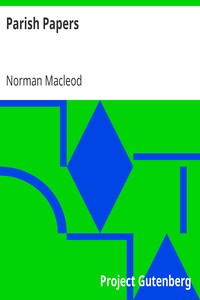| Author |
Macleod, Norman, 1812-1872 |
| Title |
Parish Papers
|
| Note |
Reading ease score: 57.5 (10th to 12th grade). Somewhat difficult to read.
|
| Credits |
E-text prepared by the Project Gutenberg Online Distributed Proofreading Team
|
| Summary |
"Parish Papers" by Norman Macleod is a religious treatise written in the mid-19th century. The work delves into the essence of Christianity, emphasizing the pivotal role of Jesus Christ and exploring various theological concepts, including final judgment, eternal life, and the nature of faith in Christ. Macleod, addressing the faithful of his congregation, seeks to present a compelling case for the divinity of Christ and the integral relationship between love for Jesus and the Christian faith. The opening of "Parish Papers" introduces a series of thoughtful essays that pose critical questions about the foundation and essence of Christianity. Macleod initiates with an exploration of what Christianity means, arguing that understanding it requires a focus on the teachings of Jesus Christ as historically recorded in the New Testament. He argues that Christ is not just a moral teacher but the central figure to whom all aspects of Christian faith must point. Through his systematic approach, Macleod highlights that belief in Christ is fundamental to understanding the Christian religion, and he evokes a deeper contemplation of theological tenets as they relate to personal faith and communal beliefs. The beginning sets the stage for an in-depth examination of the faith's critical doctrines that continue to resonate with readers seeking understanding in their spiritual journeys. (This is an automatically generated summary.)
|
| Language |
English |
| LoC Class |
BR: Philosophy, Psychology, Religion: Christianity
|
| Subject |
Christianity
|
| Subject |
Church history -- 19th century
|
| Category |
Text |
| EBook-No. |
12605 |
| Release Date |
Jun 1, 2004 |
| Most Recently Updated |
Dec 15, 2020 |
| Copyright Status |
Public domain in the USA. |
| Downloads |
52 downloads in the last 30 days. |
|
Project Gutenberg eBooks are always free!
|

